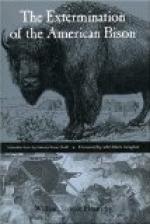Mr. Sargent said: “I think we can pass the bill in the right shape without objection. Let us take it up. It is a very important one.”
Mr. Frelinghuysen withdrew his objection.
Mr. Harvey thought it was a very important bill, and withdrew his amendment.
The bill was reported to the Senate, ordered to a third reading, read the third time, and passed. It went to President Grant for signature, and expired in his hands at the adjournment of that session of Congress.
On February 2, 1874, Mr. Fort introduced a bill (H. R. 1689) to tax buffalo hides; which was referred to the Committee on Ways and Means.
On June 10, 1874, Mr. Dawes, from the Committee on Ways and Means, reported back the bill adversely, and moved that it be laid on the table.
Mr. Fort asked to have the bill referred to the Committee of the Whole, and it was so referred.
On February 2, 1874, Mr. R. C. McCormick, of Arizona, introduced in the House a bill (H. R. 1728) restricting the killing of the bison, or buffalo, on the public lands; which was referred to the Committee on the Public Lands, and never heard of more.
On January 31, 1876, Mr. Fort introduced a bill (H. R. 1719) to prevent the useless slaughter of buffaloes within the Territories of the United States, which was referred to the Committee on the Territories.[75]
[Note 75: Forty-fourth Congress, first session, vol. 4, part 2, pp. 1237-1241.]
The Committee on the Territories reported back the bill without amendment on February 23, 1876.[76] Its provisions were in every respect identical with those of the bill introduced by Mr. Fort in 1874, and which passed both houses.
[Note 76: Forty-fourth Congress first session, vol. 4, part 1, p. 773.]
In support of it Mr. Fort said: “The intention and object of this bill is to preserve them [the buffaloes] for the use of the Indians, whose homes are upon the public domain, and to the frontiersmen, who may properly use them for food. * * * They have been and are now being slaughtered in large numbers. * * * Thousands of these noble brutes are annually slaughtered out of mere wontonness. * * * This bill, just as it is now presented, passed the last Congress. It was not vetoed, but fell, as I understand, merely for want of time to consider it after having passed both houses.” He also intimated that the Government was using a great deal of money for cattle to furnish the Indians, while the buffalo was being wantonly destroyed, whereas they might be turned to their good.
Mr. Crounse wanted the words “who is not an Indian” struck out, so as to make the bill general. He thought Indians were to blame for the wanton destruction.
Mr. Fort thought the amendment unnecessary, and stated that he was informed that the Indians did not destroy the buffaloes wantonly.
Mr. Dunnell thought the bill one of great importance.




